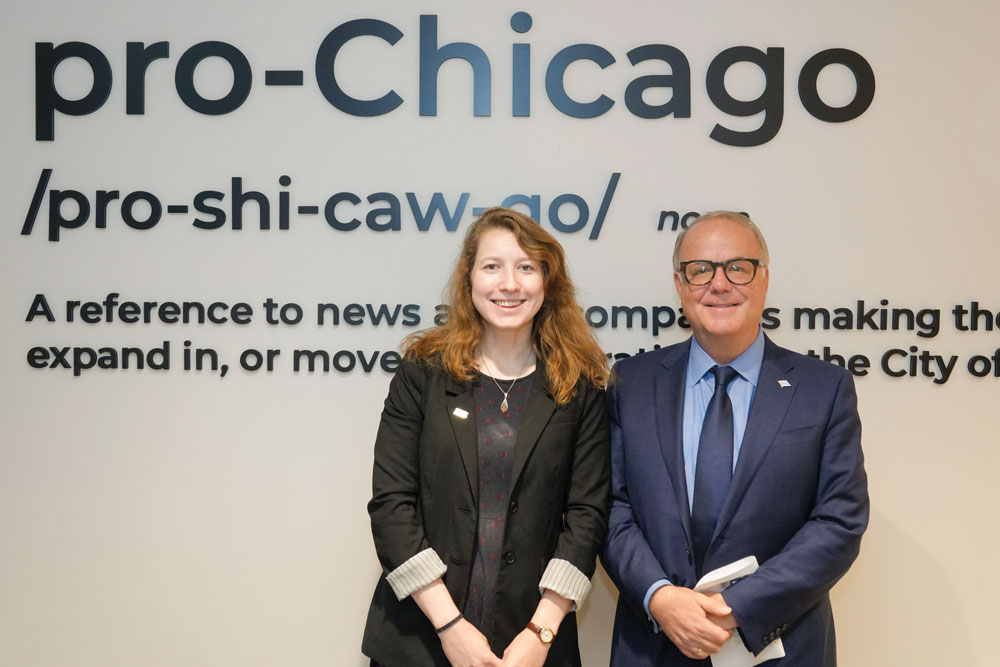World Business Chicago’s new president and CEO details the city’s many assets.
When Philip B. Clement was named the new president and CEO of World Business Chicago on April 2024, everyone in the Windy City knew that America’s second-largest financial center had found its man.
Words of praise came in immediately from a host of Fortune 500 leaders throughout Illinois and beyond. And with good reason: Clement brings to this job a wealth of experience in guiding growth at some of the world’s top companies.
Before joining World Business Chicago (WBC), Clement served as global chief marketing officer at Johnson Controls, a company with 105,000 employees in more than 120 countries and $26 billion in annual revenue. Before that, he spent 12 years as global chief marketing officer for Aon, and prior to that he launched a number of tech companies and his own consultancy.
“We are thrilled to welcome Philip B. Clement as the new president and CEO of World Business Chicago,” said Charles Smith, vice chair of World Business Chicago. “His proven leadership, strategic vision and commitment to inclusive economic development make him the ideal candidate to lead our organization as we work to drive growth, attract investment and promote Chicago as a global business destination.”
In the following discussion, Clement talks about the progress WBC has made over the years and how he intends to lead the organization moving forward.
What factors contribute to the positive business climate in and around Greater Chicago?
PHILIP B. CLEMENT: Several key factors contribute to Greater Chicago’s positive business climate, making it a prime location for businesses looking to expand or relocate. The city boasts a highly educated, diverse workforce, bolstered by strong academic institutions and dynamic diaspora communities, offering global companies not only deep talent but also valuable cross-border connections.
Chicago’s strategic location, coupled with its diversified economy, sets the region apart. With a GDP of $886 billion, Chicago is the third-largest economy in the U.S., home to robust industry clusters across food manufacturing, finance, professional services, TDL and tech. The presence of national labs, including Argonne and Fermilab, strengthens Chicago’s innovation ecosystem, supporting cutting-edge research and creating a pipeline of talent in fields like quantum computing and AI.
Chicago’s affordability, when compared to other major metros, provides companies with a significant advantage in maximizing their capital. In an era of scarce investment dollars, businesses in Chicago benefit from a lower cost of doing business while still being able to tap into a global customer base. Chicago’s strong innovation base — including over 24 corporate R&D centers and world-class research universities — positions the city as a leader in driving growth and scaling companies.
Why do so many companies announce expansion projects annually in Chicago?
CLEMENT: Companies continue to choose Chicago for expansion due to its unmatched combination of economic stability, diverse industry strengths, and a collaborative environment that fosters growth. Chicago’s economy is the third-largest in the U.S., and its diverse industry clusters create a robust ecosystem for companies looking to scale.
In 2024 alone, Pro-Chicagoland Decisions (PCD) generated 14,800 jobs, $1.32 billion in earnings, and the acquisition of more than 12.6 million square feet. Manufacturing continues to be a dominant industry, representing 40% of PCD projects, followed by professional services and transportation, which further illustrates the city’s strength across core sectors. Nearly 60% of 2024 PCDs were located in the Greater Chicagoland Economic Partnership (GCEP) counties, underscoring the power of the seven-county region in attracting business, talent and investment.
Additionally, Chicago’s leadership in emerging technologies, including quantum computing and AI, is further solidifying its position as an innovation hub. The University of Chicago’s top ranking in quantum physics research and the city’s recognition as an AI Star Hub are key factors in attracting global investment in these high-growth areas.
“Chicago’s affordability, when compared to other major metros, provides companies with a significant advantage in maximizing their capital. In an era of scarce investment dollars, businesses in Chicago benefit from a lower cost of doing business while still being able to tap into a global customer base.”
— Philip B. Clement, President & CEO, World Business Chicago
With a population of 9.4 million, Chicago offers a vast local consumer market, making it an ideal testbed for new products and services that can scale nationally. The city’s strategic location, diverse economy and continued focus on innovation make it a clear choice for companies looking to expand and thrive.
Is space getting tight in the market for office and industrial users?
CLEMENT: While Chicago’s office market continues to experience fluctuating vacancy rates, with both CBD and suburban office spaces seeing a steady increase in availability, the industrial market remains relatively tight with a lower vacancy rate.
In the Chicago CBD office market, vacancy rates have steadily increased, rising from 19.8% in Q1 2023 to an estimated 25.5% by Q2 2025. Suburban office vacancy rates are also rising, with rates hovering around 27% over the past year, indicating that office space availability is still relatively high.
However, in the industrial sector, the situation is markedly different. Vacancy rates for industrial space have remained low, with a slight uptick in recent quarters, reaching around 5.5% by Q2 2025. This still reflects a competitive market where demand for industrial space, particularly for logistics and distribution, remains robust due to Chicago’s strategic location and the continued growth in e-commerce and supply chain sectors.

World Business Chicago Vice President of Research Hannah Loftus and President and CEO Phil Clement
Photo courtesy of World Business Chicago.
While there is more available office space, the industrial market continues to face tighter conditions, driven by Chicago’s role as a critical hub for warehousing, transportation, and logistics. Businesses seeking industrial space should anticipate continued competition for prime locations.
Describe a few big projects announced recently.
CLEMENT: RJW Logistics recently expanded into a 977,000-square-foot distribution center in Joliet and secured another 640,000-square-foot industrial lease in the same area, reinforcing Chicago’s role as a key hub for transportation and warehousing.
Universal Destinations & Experiences is investing approximately $100 million to launch Universal Horror Unleashed, a year-round immersive experience. This project will transform a 114,000-square-foot building and is expected to generate over $1 billion in economic impact for the city, along with creating over 400 jobs.
Abbott Laboratories is expanding its manufacturing and R&D operations in Lake County, adding up to 200 new jobs. This follows the company’s 2022 announcement of leasing more than 100,000 square feet in the Willis Tower, further bolstering Chicago’s strength in manufacturing and life sciences.
Pure Lithium Corporation is relocating its operations from Boston to Chicago, investing $46 million to manufacture Illinois’ first commercially viable lithium metal battery, creating 50 new jobs and contributing to the state’s growing clean energy sector.
In finance, we’re also excited to share that BlackRock is expanding its Chicago presence with a new office on Monroe Street. With over $178 billion invested in Illinois public companies and pension funds benefiting 1.2 million Illinoisans, this expansion is a strong vote of confidence in Chicago’s business climate.
Do you still have plenty of available sites?
CLEMENT: Greater Chicago continues to have a healthy supply of available sites across key markets, offering opportunities for businesses looking to expand or relocate. In the industrial market, the Chicago MSA has an availability rate of 8.8%, with over 126 million square feet of available space, and more than 12.6 million square feet currently under construction, signaling continued growth and capacity to meet demand.
For the office market, the availability rate is 19.3%, with nearly 99 million square feet of available space. While office demand has been impacted by shifts in remote work, there remains a substantial inventory with new construction underway to meet evolving market needs.
In the retail market, availability stands at 5.9%, with more than 33 million square feet available. This space, along with ongoing retail development, offers excellent opportunities for businesses looking to enter or expand within the region.
Overall, Chicago continues to offer a range of available sites across industrial, office and retail sectors, backed by strong infrastructure and ongoing construction to support future growth.

